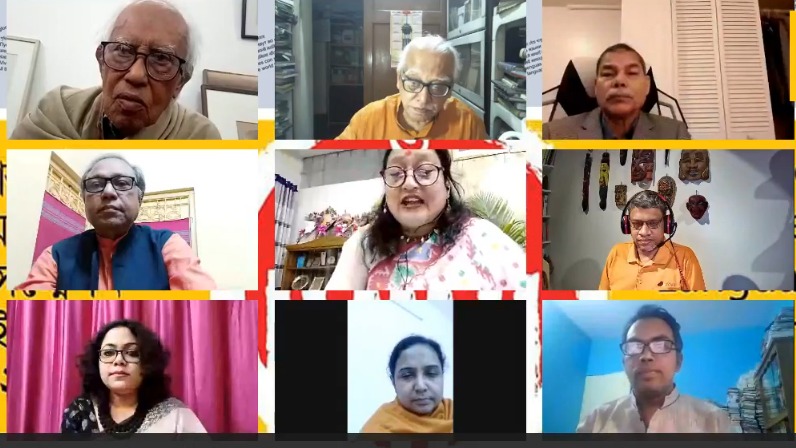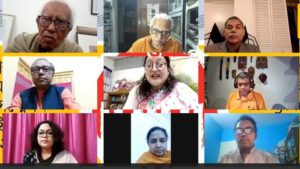“Bangla Needs To Be Introduced In A Holistic Manner”-Pabitra Sarkar at Virtual Conference on International Mother Language Day


A four-day long virtual conference on the occasion of International Mother Language Day’ was organized recently. The conference was inaugurated on 19th February by a noted language activist and Rabindranath researcher Ahmed Rafiq.
The conference was organized digitally by two organizations jointly, Mukto Ashor (Bangladesh) and Chhayanat (Kolkata) on the occasion of Shaheed Dibash (Language Martyrs’ Day) and International Mother Language Day. The theme of the conference was ‘let all languages of the world thrive in their own glory. 37 eminent teachers, researchers, educationists, artists, and media personalities of nine countries participated in this four daylong conference. This conference was supported by Bangladesh History Olympiad National Committee and swapno’71 publication.
Somerita Mallik, president of Chhayanat (Kolkata) said that every year they organize this two-day festival but this year it had to be done digitally due to the pandemic. The main aim of the initiative is to address the significance of learning one’s own tongue to the English-speaking generation of today.
Abu Sayed, president of Mukto Asor (Bangladesh) said that this is the first time a four-day-long online conference was held on the occasion of International Mother Language Day.
The first-ever International Mother Language Award has been conferred on three people and an organization for their contribution to the preservation and promotion of mother language nationally and internationally. Education Minister of Bangladesh Dipu Moni handed over the awards on behalf of Prime Minister Sheikh Hasina on 21st February during an event at the International Mother Language Institute in Dhaka. National Professor Dr. Rafiqul Islam has been honored for his contribution at the national level. A Nazrul researcher, Prof Rafiqul is the first Nazrul Professor of Dhaka University’s Bangla Department and the first director of Nazrul Research Institute. A former vice-chancellor of the University of Liberal Arts Bangladesh and director general of Bangla Academy, Prof Rafiqul won the Ekushey Padak, Swadhinata Padak, and Bangla Academy Award among others.
Mathura Bikash Tripura, executive director of Jabrang Welfare Association in Khagrachhari, received the award for his work to protect the native tongues of small ethnic groups.
National Professor and prominent Nazrul researcher Dr. Rafiqul Islam, Bangladeshi novelist Selina Hossain, Maj. Gen. (retd) Masudur Rahman Bir Pratik, Professor of the Institute of Bangladesh Studies Swarochish Sarkar, Researcher and writer Manik Mohammad Razzak, Stage and television personality Kha. Ma. Harun, Researcher and development worker Mathura Bikash Tripura, researcher Shuvro Jyoti Chakma, researcher Hasinul Islam, Prominent singer and artist at the Swadhin Bangla Betar Kendra Bulbul Mahalanobish, Nazrul musician Shahid Kabir Palash, translator AHS Mohammad, researcher from Assam Dr. Rezaul Karim, e-learning expert from the United States Professor Dr. Badrul Huda Khan, researcher Dr.Shuvra Datta, Nazrul singer Salauddin Ahmed, Shilpi Rahman from Australia, Peruvian film and writer Walt V Azaña , teacher Mukesh Shrestha from Nepal, Russian educator Victoria Charkina, Poet and writer Shamim Azad from London, Priyojit Debsarkar from UK, Habib Babul from Germany, Freedom fighter Msa Mansur Ahmed, presidium member of the national committee of Bangladesh History Olympiad Prof. Dr. Emran Jahan, Dr. Abeda Sultana, Nurun Akhter, Ahmed Helal, Coch Kazi Samio Shashi, Mukto Asor founder and president Abu Sayed, Chhayanat (Kolkata) president Somerita Mallik, Dhaka university teacher Shanta Tawhida, Singer Shaila Rahman And Muktobondhu Nafiza Rahman joined the conference.
Pabitra Sarkar added that pledges and rhetoric are not enough to uphold language. Careful planning is required. Bangla had not yet been adapted properly in all spheres of education. As a result, while the mother language may be practiced in humanities subjects, there are serious shortcomings in this regard when it comes to science, engineering, medical science, business, and research. It is essential to introduce Bangla in a holistic manner in all spheres, replacing foreign language. Only then can one do justice to the Mother Language.
